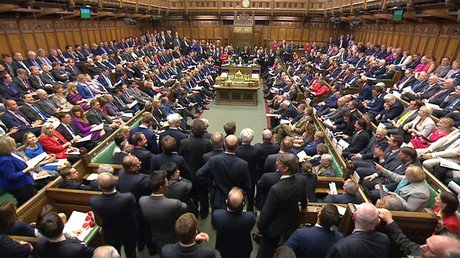‘Won’t pass, won’t work, likely to make things worse’: Ron Paul on new presidential war powers bill

US Senate lawmakers are considering a bill that would somewhat restrict the president’s powers to go to war. Ron Paul, a former congressman and interventionism critic, says he is highly skeptical of the initiative.
The bipartisan resolution was introduced by leaders of the Senate Foreign Relations Committee, Senators Bob Corker and Tim Kaine, in the wake of President Donald Trump’s decision to attack targets in Syria in retaliation for an alleged chemical-weapons attack. The legislation aims to repeal the broad authorizations Congress approved in 2001 and 2002 for the wars in Afghanistan and Iraq, replacing them with a more restrictive authority.
Dr Ron Paul, a libertarian politician and advocate of ending America’s interventionist foreign policies, told RT that the resolution is not a solution to the actual problem, which is that US lawmakers have abdicated their constitutional right to control America’s war making.
“[The US lawmakers] have been very negligent for a long time. Ever since World War II, we’ve gone to war so many times and we’ve never done it properly. But I don’t think the resolution they have proposed is an answer to it, because it more or less is defining things slightly differently, but it would not slow up the effort to go to war.
“It does say that the president would have an authority to go to war against radical violent groups like Al-Qaeda and ISIS and maybe Taliban, but not a country. But I think it is very difficult to tell [things apart]. In countries where the Taliban is – can you always separate it from the government? What if somebody came up and said: ‘[Syrian President Bashar] Assad is a radical?’ This open-ended stuff is why we are in such a mess,” he stated.
The US Constitution puts the authority to declare war in the hands of Congress. America’s founding fathers perceived war as a calamity for the people and thought that direct representatives of the people are most qualified to make decision on whether the country should enter conflict.
But over the past decades, the US executive branch has been circumventing the proper war authorization process, culminating in the post-9/11 situation, when the president was basically authorized to conduct unrestricted wars as long as he could argue that it was done to hold people responsible for the 2001 terrorist attacks accountable.
This record makes Paul highly skeptical about the latest piece of legislation, he said, even if he appreciated the debate in relation to the problem. “When they pass such resolutions, most of the time things get worse. That’s what happened with the [post-Vietnam] War Powers Resolution of 1973. I don’t think it will pass. If it does, it wouldn’t accomplish a whole lot. If it accomplishes anything, it’s more likely to make things worse for us, who would like to stay out of wars and to protect or liberties here at home.”
Paul said if Congress actually wanted to stop US military action in Syria, it would have done so with ease by using the authority that lawmakers already have. “All they need to do under today’s circumstances is write a short law: none of these funds can be used to pursue military action in this country of Syria. And that will curtail the president,” he explained. “The Congress and the people have the power over the purse. But we are very careless and our Congress is not diligent in exerting the authorities they have and they defer to the executive branch.”
Officials in the executive, he said, “are usually much more influenced by special interests – the people who make money off wars, people who want to control the oil and people who have all those other nefarious reasons why we get involved in these war.”
He added that the US government has been relying on scaremongering to pass legislation encroaching on domestic freedoms like the Patriot Act or to pursue aggressive foreign policies. “They wait for an emergency, they get people scared to death and galvanize by saying: Do it, or you are un-American, you have to vote for it,” Paul said.
Think your friends would be interested? Share this story!

















